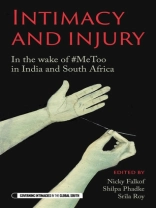Both India and South Africa have shared the infamy of being labelled the world’s ‘rape capitals’, with high levels of everyday gender-based and sexual violence. At the same time, both boast long histories of resisting such violence and its location in wider cultures of patriarchy, settler colonialism and class and caste privilege.
Through the lens of the #Me Too moment, the book tracks histories of feminist organising in both countries, while also revealing how newer strategies extended or limited these struggles. Intimacy and injury is a timely mapping of a shifting political field around gender-based violence in the global south. In proposing comparative, interdisciplinary, ethnographically rich and analytically astute reflections on #Me Too, it provides new and potentially transformative directions to scholarly debates this book builds transnational feminist knowledge and solidarity in and across the global south.
قائمة المحتويات
Introduction:Intimacy, injury and #Me Too in India and South Africa – Srila Roy, Nicky Falkof and Shilpa Phadke
Part I: Pre-histories
1 South Africa’s own ‘Delhi moment’: news coverage of the murders of Jyoti Singh and Anene Booysen – Nechama Brodie
2 Hokkolorob, campus politics and the pre-histories of #Me Too – Paromita Chakravarti and Jhelum Roy
3 Reading in-between the sheets: in conversation about SWEAT’s #Say Her Name – Ntokozo Yingwana and Nosipho Vidima
Reflection: ‘When will the State be #Me Too’d?’ – Jyotsna Siddharth
Part II Me Too’s silences
4 Moments of Erasure of the testimonies of sexual violence against Dalit women – Rupali Bansode
5 #Metoo and the troubling of the rural public sphere in India: a feminist media house reports from the hinterland – Disha Mullick
6 Contesting the meaning/s of sexual violence in the South African postcolony: where are the male victims? – Louise du Toit
7 Rebuilding precarious solidarities: a feminist debate in internet time – Shilpa Phadke
Reflection: Progressive men and Predatory Practices – Jessica Breakey
Part III Institutional locations: The university and the State
8 #End Rape Culture and #Me Too: of intersectionality, rage and injury – Amanda Gouws
9 From harassment to transgression: understanding changes in the legal landscape of sexual harassment in India – Rukmini Sen
10 Feminism and fallism in institutions: in conversation with Jackie Dugard – Zuziwe Khuzwayo and Ragi Bashonga
Reflection: Beyond the media storm: on sexual harassment in the news and the newsrooms – Nithila Kanagasabai
Part IV: Affect and aesthetics
11 Fury, pain, resentment … and fierceness: configurations of con/destructive affective activism in women’s organising – Peace Kiguwa
12 Queer feminism and India’s #Me Too – Jaya Sharma
13 Fugitive aesthetics: performing refusal in four acts – Swati Arora
Reflection: ‘Gay boys don’t cry when we’re raped’: queer shame and secrecy – Jamil F. Khan
عن المؤلف
Nicky Falkof is Associate Professor of Media Studies at the University of the Witwatersrand Shilpa Phadke is Professor at the School of Media and Cultural Studies, Tata Institute of Social Sciences, Mumbai Srila Roy is Associate Professor of Sociology at the University of the Witwatersrand












